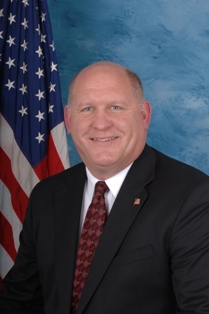Op-Ed: EPA’s War on Consumers, Affordable Electricity & Jobs

Why regulation, not cheap gas, is the chief cause of coal-fired power’s demise
 by U.S. Representative Glenn ‘GT’ Thompson (PA-5)
by U.S. Representative Glenn ‘GT’ Thompson (PA-5)
Over the past year, we’ve heard a lot about the Obama Administration’s ‘War on Coal’. The White House has been quick to dismiss the notion, pointing to their “all-of-the-above” energy policy. They’ve attributed the demise of coal-fired power in part to the record-low prices of natural gas. While most agree that the coal industry has faced challenges, especially under current economic conditions, the argument that people are shutting down coal power plants because gas is cheaper just doesn’t hold water.
Why? Coal is by far the cheapest source of electricity. So if cost isn’t the reason, what is?
Since 2009, President Obama’s Environmental Protection Agency (EPA) has advanced a series of major environmental regulations, totaling billions in new operating costs and compliance requirements, which are making it increasingly harder for coal to compete. To be fair, several of EPA’s regulations have been under consideration for more than a decade, while others have been compelled by court order. Regardless of origin, the majority of the regulations are unprecedented in scope and cost.
Nationally, 175 coal-fired power plants are scheduled to be shut down from 2012 to 2016, according to an analysis by the non-partisan U.S. Energy Information Administration (EIA). Industry experts predict that over a similar time frame these closures could threaten hundreds of thousands of jobs. According to a 2011 study by the National Economic Research Associates, two of the proposed EPA regulations could lead to a net employment loss of almost 60,000 jobs in Pennsylvania between now and 2020. The same report showed that Pennsylvania could witness average electricity prices increase by as much as 17%.
Look no further than the Fifth Congressional District of Pennsylvania, where we’ve lost numerous coal facilities in just the last nine months, to witness the real-world impact of EPA’s regulatory onslaught. In February, GenOn Energy, which has about 80 employees in Clearfield County, announced plans to close its Shawville plant in 2015, which means a loss of 100-200 related jobs over the next few years. In August, Joy Mining, the largest private sector employer in Venango County, began several rounds of layoffs in Franklin. Most recently, in September, Alpha Natural Resources announced 1,200 layoffs in numerous states, including one facility in Jefferson County and several others across Pennsylvania.
Coal remains the nation’s principal source of electrical power generation for one simple reason: low cost. In terms of real dollars per unit of energy, the cost of generating electricity from coal is a fraction of the cost of producing it from any other energy source. Coal provides almost 40% of electric power generation nationally, and an even greater share, 44%, here in the Commonwealth.
The recent boom in shale gas production has led to an oversupply of natural gas and consequently lower prices. As a result, it has increased from 19% to 25% over the last decade as a percentage of the nation’s total electricity generation. Despite its growth, natural gas as a substitute for coal brings numerous challenges from infrastructure and transmission to storage and pipeline capacity. These challenges must be addressed before natural gas can become the dominant feedstock for power generation. With no doubt, natural gas has helped diversify our nation’s energy portfolio, which will remain critical in the years ahead, but it is in no position to displace coal any time soon.
Figures from the EIA show that electricity demand domestically and globally will increase over the next several decades. What some fail to recognize – or worse, refuse to admit – is that for decades to come coal will remain an indispensable source of power if we are to meet this demand.
It’s unfortunate that the Obama Administration fails to comprehend the serious challenges we face when it comes to meeting the nation’s demand for affordable and reliable electricity, and has grossly underestimated the cumulative impact of its regulatory actions. Attempts to cloak it with “all-of-the-above” propaganda fail to meet the smell test.
In 2008, then-candidate Barrack Obama, in forecasting his administration’s policy on coal, stated the following: “So if somebody wants to build a coal-powered plant, they can. It’s just that it will bankrupt them.” Since taking office, the President and his administration have moved forward with this plan. It’s an agenda to eliminate coal as a source of power, with no clear plan to replace it or the growing number of jobs being lost in its wake.
Make no mistake; there is a war on coal. It’s also a war on consumers, affordable electricity, and American jobs.
